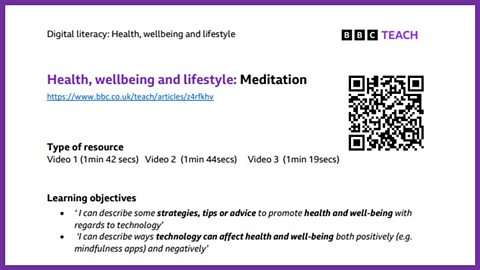Video summaries
Everyone can have a difficult moment from time to time. And being constantly online can make students feel like there's not enough time to gather their thoughts.
These three short meditation videos can help your students step away from digital distractions and get through to the other side.
Moment of crisis
Sometimes life can feel uncertain and challenging β have you ever felt stuck, upset about a message somebody sent in the group chat, or worried about a post youβve seen online? If this sounds familiar, weβve got you covered!
Moment of relaxation
Find a little space to care for your mind, wherever you are, and whenever you like. The best thing you can do when you feel stressed or worried is just to take five and step away from everything! Remember that talking to a trusted adult can really help you solve the problem.
Moment of reflection
Do you get too many notifications? Do you feel like there's never enough time to gather your thoughts? It's time to hit pause, and to reflect.
Teaching notes
Videos: Moment of crisis = 1min 42sec, Moment of relaxation = 1min 44sec, Moment of reflection = 1min 19sec
Learning objectives
(from the set out by the UK Council for Internet Safety)
- I can describe some strategies, tips or advice to promote health and well-being with regards to technologyβ
- I can describe ways technology can affect health and well-being both positively (e.g. mindfulness apps) and negatively
Content summary
Three short videos that demonstrate how children can use the internet for things like guided meditation:
- Moment of relaxation: A meditation to help you find calmness
- Moment of reflection: A meditation on how to reflect
- Moment of crisis: A meditation to deal with difficult moments
Glossary
- Overwhelmed: to be overcome with emotion
- Distractions: something that stops you from fully concentrating on something else
- Uncertain: unsure
- Challenging: tough, difficult
- Adapt: change to fit the circumstances or the environment
- Inhale/Exhale: breathing in/breathing out
- Tension: mental, physical or emotional strain
Topic introductions and starters
Before the video:
- Ask the pupils to write down what they think meditation is and how it is done β these wonβt be shared and there are no wrong answers
After the video:
- Decide on what βmeditationβ means, both in general (thinking and reflecting quietly about something) and specifically (a mental exercise used to focus and become calm) and how it is used as part of a spiritual practice e.g. Buddhism
- Clarify any new vocabulary and specific terms: overwhelmed, distractions, uncertain, challenging, adapt, tricky, notifications, respond, appreciate, aware, inhale, exhale, tension
- Work individually to make a list of some of the negative or stressful feelings that people can experience when involved in online activities
- Give some time to actually practice the meditation moment suggested in the video as a class or small group β put books and pens away and close your eyes
Discussion Points
- What is a digital distraction? Notifications pinging on your phone? Scrolling the news about a celebrity you like? Watching funny videos to avoid homework?
- Is stepping back a good idea if you are stressed/overwhelmed/upset? How will stepping away from a stressful situation make you feel? Are there people you can talk to, such as friends, family or teachers?
- Meditation feels silly β I canβt do itβ¦ How did it make you feel? Do you notice feeling a calmer, or did you find it frustrating? Meditation is like sport or a hobby, it can take practise.
- What are the benefits of meditation? Did your heart rate slow? Has your breathing returned to a calmer rate? Do you feel more awake?
- What else can I do to relax/reflect/deal with a crisis? Physical exercise? Listen to music? Try solving a puzzle? Go for a walk? Write a poem? Draw a picture?
Fillers and fast finisher activities
- Make a list of familiar online activities, and then add positive AND negative feelings that they might produce
- Watch the videos again and summarise the first section before the meditation in just a couple of sentences β then try and reduce that to just a few words
- Create an illustrated list of positive things to say to yourself when you are feeling down β use ideas from the videos. Use βI amβ and βI canβ statements
- Draw cartoon characters with speech bubbles containing some of the positive and calming and focussing statements from the videos
- Use screenshots from the animations and ICT and make a storyboard version of the videos that can be presented or printed
Signposting potential homework activities
- Create a poster with either REFLECT or RELAX at the centre β add other useful words and phrases and illustrations
- Share the meditations with family members and practise them each day for a week β keep a diary to note down how they made you feel
- Record yourself speaking the same words from the video but directed at yourself β try out the meditation
- Write your own meditation to help with how you sometimes feel when spending a lot of time online β call it βA Moment ofβ¦β
For download/printing

More from: Health, wellbeing and lifestyle
The five ways to wellbeing. videoThe five ways to wellbeing
Five ways that you can look after your mental health and wellbeing.

Digital detox tips. videoDigital detox tips
Katie Thistleton gives advice on when and how to take a break from screens and social media

Feeling the need for a digital detox? quizFeeling the need for a digital detox?
A quiz that asks questions and helps people recognise when they need a break from screen time
